-
The Nameless Dead by Kristine Kathryn Rusch
Rusch is known to write about a future with advanced spacefare and aliens, but where some of the injustices in todays world still lives on. I recently wrote about “The Impossibles” with that theme. In this story the narrator isn’t exactly a likeable person that wants to fight injustice - though she might end up doing just that.
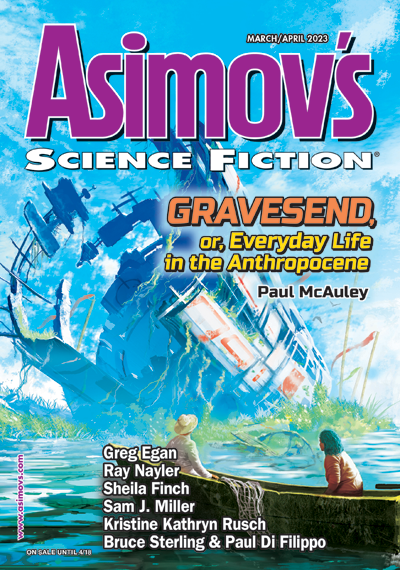
The narrator is a woman who works as a private detective, sort of, on some planetary settlement. She ended up there after she left her life and family on Earth behind when she signed up for a voyage across the galaxy. She signed all the waivers on the consequences of time dilation, but it took her a while to actually understand it - and then there was no going back. Now she offers investigative services to other people in a similar situation, by going through various data sources for information on their families back on Earth where at least a 100 years have passed. She gets a big case where she is tasked with investigating hundreds of travelers, which unveils a much greater crime that she is used to dealing with.
Rusch has made an interesting choice by having a narrator that is rather unlikable. She has a lot of self-hate but no real regrets on leaving behind her son and husband. The effect of this is that we don’t really have sympathy for her in the beginning, because she just have to live with the consequences of her actions, but through her investigations we hear of people who have ended up in the same situation as her having lost their families to the effects of time dilation - except they claim to not have done so knowingly.
The emotional impact isn’t quite on the same level as that famous scene in the movie Interstellar, but the story pushes the same buttons in that regard.
Read in Asimov’s March/April 2023
Rating: 3+ -
Death Game by David Gerrold
A reality tv show where it is literally about life and death is not a new idea in science fiction, and this story might not be very original, it still handles the subject in a very believable and engaging way.
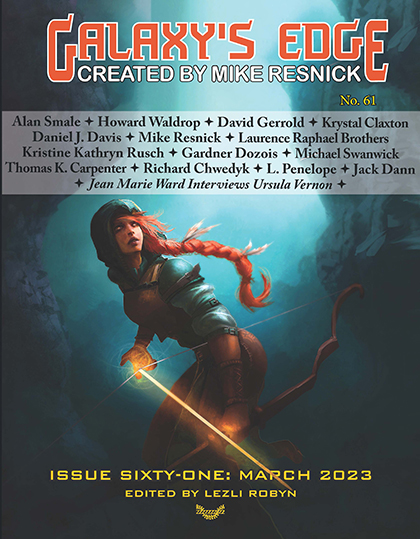
The concept introduced here is pretty simple. 1000 people sign up for the event, everybody has to swallow a pill and a random person dies. Proceed to the next round to win more money or quit and keep your winnings. Rinse and repeat. The story is told by one half of a couple who entered together, so we know at least one of them survived, but how it all develops throughout the several months long tv program kept me hooked from start to finish.
It is sort of predictable how things escalates, how they have doubts as the odds gets worse and how they get hooked on the thrill so they can’t stop even though their winnings are already way beyond their initial goal. Even though the story didn’t throw any huge surprises at me - the ending being a slight exception but not huge - the execution from Gerrold is just very well done. I was hooked like it was an actual game show I was watching and everything surrounding it felt very realistic and plausible. I wouldn’t completely rule out such a reality show in some future at least.
Read in Galaxy’s Edge March 2023
Rating: 4 -
The Repair by Mark D. Jacobsen
This short story is set in a cyberpunkish future with an internet controlled by spambots and even the smallest misstep on social media, will get a person “cancelled” into oblivion.

We follow Joel who works odd jobs with various technical repairs. Over the years he has managed to get quite a few augmented upgrades on himself to be able to do advanced tasks, but his clients are mostly on the edges of society. He is tasked to do a repair on a humanlike robot by a very nervous and skeptical woman. She will not give him any information about herself or the reason for the repair job. Joel has his own sources though and manages to get enough data on her to know her name and that she posted something possibly racist on Twitter, which has ruined her life because automated bots make sure that every misstep online is never forgotten and everything she tries to do online is hampered by AI bots. Joel has his own similar baggage and even though she doesn’t ask for it, he tries to help her more than just repairing her robot.
In a relatively few pages, the author manages to create a bleak and dystopian future with no digital privacy and “cancel culture” is taken to extremes and out of control by automated bots. It is not a story that gives all the answers, give complete background stories or even resolve all plot threads, but it doesn’t need to. There is plenty of depth in this well written short story.
Read in Asimov’s March/April 2023
Rating: 3+ -
Silo, Sweet Silo by James Castles
This story felt a bit like the classic nuclear scare stories from the 50s updated to the 21st century.
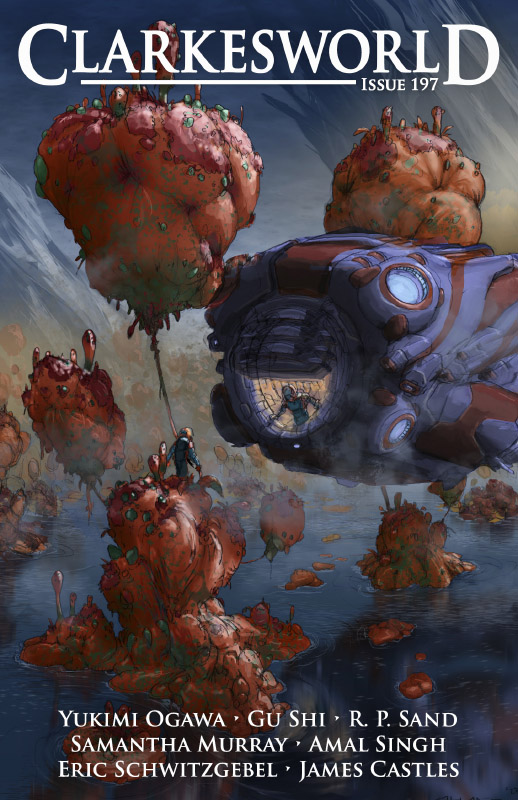
In some undetermined future destroyed by what I would assume was a nuclear war, a group of humans approaches a missile silo base station still in operation. It is operated by an AI and the story is told from its perspective in second person (which was bit of a weird choice in my opinion, but it didn’t detract from the experience).
The humans are seeking food and shelter and the silo can provide it - on one condition. It needs a human operator to fulfill its ultimate purpose: launch the missile towards the enemy. The humans are not really keen on that, thinking the world have seen enough death. They do agree to postpone the issue a month while the humans are allowed to get settled in the silo base. As the story moves forward, the AI running the silo starts having doubts on its programmed purpose in “life”.
I don’t know if the author was inspired by the classic Theodore Sturgeon story “Thunder and Roses”, but it many ways it reminded me of that story - though not as grim.
Read in Clarkesworld February 2023
Rating: 3+ -
Buddha Nature by Amy Thomson
This novelette has a bit of an unusual setting. The story takes place entirely in a Buddhist monastery and follows a robot that seeks to achieve enlightenment as a monk.
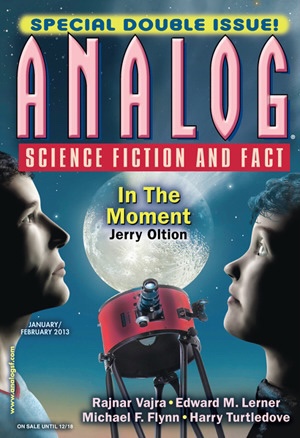
The robot called Raz is a cataloging robot specially built to absorb and catalogue books. Its previous function turned obsolete, so it sought out the monastery by itself. After some debate between the monks, the robot is accepted in the community as an equal. Not without issues though. Especially one other monk is very adamant that spiritual enlightenment is only for humans and a soul-less unconscious machine should not be allowed.
This simple but effective setup creates a story with lots of philosophical debate about sentience, free will and spiritual topics. A theme that has been explored in countless science fiction stories, and while I haven’t seen one that took place in a religious setting like here, there isn’t much new to add.
While the story is easy to follow and reasonably engaging, I was thinking of the classic Star Trek TNG episode “The Measure Of A Man” which deals with lots of the same questions and uses the same type of conflict to setup the arguments for and against - and ultimately does it better.
Read in Analog January/February 2013
Rating: 3+ -
Time Out by Edward M. Lerner
One of the great things about going back to older issues of a magazine is when you read a great story that you would otherwise have missed, because it hasn’t been reprinted much. This time travel novella is one such story.

The setup of this story could almost have come out of the same magazine in the 1930s. Jonas is the typical mad scientist. He is working alone because his fellow researchers at the university have turned their back on him and his unorthodox interests. He is claiming to be very close to discovering time travel. He needs an assistant at his lab and along comes Peter, an ex-convict willing to accept the low paying job but with full accommodation at the scientists’ lab.
The version of time travel that Jonas invents is the one where it is possible to send objects back in time. But only if there is a compatible receiver running in that time. Neatly explaining why no time travelers from the future have been seen yet. In all this, Peter is doing his job as a general handyman while being equally intrigued and perplexed by what is going on. He becomes somewhat friends with Jonas and they go through the usual motions of discussing all the well known paradoxes of time travel.
As the story moves forward and Jonas successfully manages to get messages from his future self - with some good stock tips among other things - Peter becomes increasingly worried about the consequences of trying to change the course of history. Butterfly effect and all that.
While the story starts kinda light, the tone gets progressively darker. The stakes are ramped up and the cascading effects of messing with time lines become harder to ignore. While this story doesn’t do much new with how it deals with time travel paradoxes, it handles them well and understandable. The author is aware that the typical Analog reader likely knows the genre well enough, and he uses that to take what might seem at first to be the usual route for time travel stories, but the ending was something different - and quite moving I might add. Very much recommended.
Read in Analog January/February 2013
Rating: 4 -
The Area Under the Curve by Matt McHugh
The setup for this is an Earth that has become increasingly unlivable so humanity has planned a big generation ship, but only a limited number of people can go.
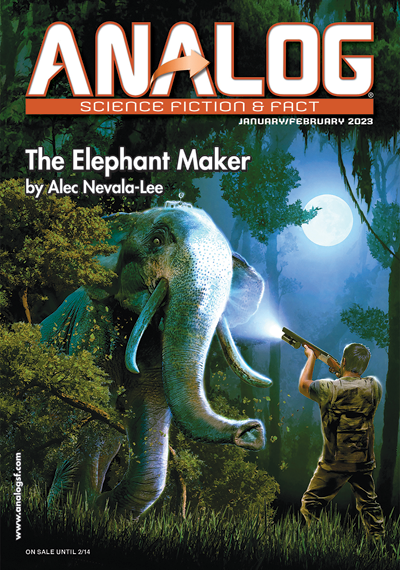
The story follows a couple who has managed to get a seat on the generation ship through hard work and excelling in basically every imaginable test. It is clear that only the top 0.001% have a chance. They want only the absolute “best” on this ship. I am making quotes around the “best” part because one of the key points of the story, is whether intelligence is the only and proper way of determining who are worthy of making the foundation for the survival of the human race. The problem arises when their child is deemed not excellent enough to get a seat on the ship. He is just an average child. The father thinks they should send him back to Earth to his grandparents, so they can retain their place on the generation ship. The mother has a different opinion.
I found this to be a story with plenty of potential for some exploration into personal morales and what is for the greater good. I frequently see stories like this in Analog that really aims for tackling complex and interesting humanistic issues. The downside is that often the result is rather superficial. The story jumps straight at the problem at hand and doesn’t waste any time, but it comes with a lack in character development. We are just told how they think and feel, without having a good grasp of who these characters are, their motivations or why they act like they do. Which is a shame, because the actual premise is interesting, but without any sort of character depth it isn’t as engaging as it could be.
Read in Analog January/February 2023
Rating: 2+ -
Neighborhood Watch by H.G. Stratmann
A delightfully silly story with the amusing premise that all the planets in the solar system are inhabited with intelligent life, only humans don’t know it.

All the different species in the Solar System have some sort of union where they discuss things and what to do with the increasingly curious humans. It was easy enough to fool the scientists of Earth when they invented telescopes, but with spaceships surveying planets and landrovers on Mars, the need for complex holographic illusions has increased. The story evovles around the martian Twee’ll (a clear reference to Tweeel from Stanley G. Weinbaums “A Martian Odyssey”) and its dealings with the other solar species about how to proceed with the Earth situation.
This is the type of story I always love to see in Analog. There should be room for these less than serious stories - as long as they are as entertaining as this one.
Read in Analog January/February 2013
Rating: 4 -
Direct Message by Tom R. Pike
A single tweet on Twitter can have massive impacts in the real world. This amusing little story begins with a poll on Twitter asking which region should be destroyed by a heat ray, with Appalachia “winning” by a large margin.

The story is told by a man who has been engaging with this specific Twitter account for a while. He discovers that it is not just a joke account, but actual aliens who really have a death ray capable of killing everything in that region with 25 million people. But maybe he can talk them into a different deal.
As might have been guessed, this is a somewhat quirky story written in a humorous light style, while still keeping it serious enough not to be completely silly. We only see the aliens through correspondence through Twitter - still, I found them to be rather convincing even though the whole scenario is a bit far-fetched.
Read in Analog January/February 2023
Rating: 3 -
Descartes’s Stepchildren by Robert Scherrer
This was a very Analog-esque story. Scientists discover something incredible but the consequences are more messy and complicated. Here we delve into a test for human consciousness.

John and his research partner have developed a special MRI scan that can detect where the consciousness lies in the brain. The twist is that their tests show that about 20% of human test subjects are not really conscious. This discovery hits Johns partner hard, because according to the test his wife’s brain shows no activity in the consciousness-center. She is a what is named a Blank in the story. John wants to publish their results anyway and the world changes drastically when their findings become public knowledge.
A test becomes widely available and many people start to test themselves, their kids, future employees and so on. The Blanks quickly become second-rate citizens unable to get a job or stay in a relationship. Many kids ends up as orphanages because their parents don’t want them. John gets rich for his patents on the tests, but he has increasingly moral qualms about the whole thing.
This story has a lot to unpack. There are plenty of philosophical and existential questions to ponder with the concept of human consciousness. I like the general premise of this story, but the consequences to the greater society are only dealt with in broad headlines since the primary focus is on John. Also, I found that their test was a little too easily accepted as scientific fact. Of course these simplifications are needed for the story to work, but I wasn’t totally convinced of what happened. My reading experience might have been hampered a bit by reading “The Algorithms for Love” the same day. It has a completely different approach to dealing with humans free will, but managed to create a more personal depth to it, whereas this story had a broader and distanced perspective.
Read in Analog January/February 2013
Rating: 3